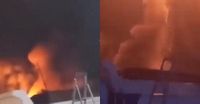In a dramatic escalation of hostilities in the Middle East, Israeli Navy ships launched a missile strike on the Haziz power plant, the last operational electricity source in Houthi-controlled Sanaa, Yemen, early Sunday morning, August 17, 2025. The attack, which damaged generators and set off a fire in the Sanhan district south of the Yemeni capital, was described by Israeli officials as a direct response to a barrage of recent Houthi missile and drone attacks targeting Israel.
According to reporting from Marine Insight and The Times of Israel, the Israeli Defense Forces (IDF) confirmed that the operation was executed by Navy missile boats, marking only the second time Israeli warships have struck targets in Yemen. The strike, which military analysts believe involved the advanced Blue Spear missile system—a land-attack adaptation of the Gabriel anti-ship missile—demonstrates Israel’s growing naval reach and willingness to use long-range maritime assets in response to regional threats.
“This was just the beginning,” Israeli Defense Minister Israel Katz declared on August 17, warning that the consequences for the Houthis would be “severe and painful” if attacks on Israel continued. He added, “Whoever raises a hand against Israel, his hand will be cut off.” The IDF stated unequivocally that the strikes were a direct retaliation for “repeated attacks by the Houthi terror regime against the State of Israel and its citizens, including the launching of surface-to-surface missiles and UAVs toward Israeli territory.”
The Houthis, an Iran-backed militia that seized control of Yemen’s capital in 2014, have increasingly targeted Israel and international shipping in the Red Sea since November 2023. Their attacks, which they claim are in support of Palestinians amid the ongoing Gaza conflict, have included dozens of ballistic missiles and drones. According to Reuters and firstpost, since March 18, 2025—when the IDF resumed its offensive in Gaza—the Houthis have launched 69 ballistic missiles and at least 22 drones toward Israel. During a ceasefire in January 2025, they briefly paused operations after firing over 40 ballistic missiles and dozens of drones, one of which killed a civilian and injured others in Tel Aviv in July.
Just days before the Israeli naval strike, on August 14, the Houthis claimed to have fired a ballistic missile at Israel’s Ben Gurion Airport and launched six drones toward Israeli territory. The IDF reported that the missile was intercepted before it could reach Israel, one drone was shot down south of Eilat, and the other five had not arrived as of the time of reporting. In a sign of the ongoing tit-for-tat, only hours after the Israeli strike on the Haziz power plant, the Houthis fired another ballistic missile toward Israel, which was also intercepted without causing casualties or damage.
The impact of the Israeli strike was immediate and severe for the residents of Sanaa. Local Yemeni media reported at least two explosions in the city’s south, with the Haziz generating plant taking the brunt of the attack. Mashal al-Rifi, CEO of the Sanaa Electric Corporation, told reporters that the facility “was under attack, causing a temporary power outage.” Houthi-affiliated Al Masirah TV confirmed that the strike knocked generators out of service in the Sanhan area, forcing operations to halt and igniting a fire that was eventually contained by firefighting teams. Residents posted social media videos showing large fires and a distressed population grappling with sudden darkness and uncertainty.
Houthi political bureau member Hazam al-Asad condemned the Israeli strike on social media, accusing Israel of “targeting only civilian service facilities like electricity and water.” The Houthis have consistently framed Israeli strikes as acts of aggression against Yemen’s civilian infrastructure, while Israel maintains that such facilities are legitimate military targets due to their use and control by Houthi forces.
Military analysts, cited by Marine Insight, noted that the use of Israel’s Saar-6 corvettes and the Blue Spear missile system for the strike showcased Israel’s ability to conduct deep, long-range attacks well beyond its coastal waters. The Blue Spear, with a range of up to 300 miles and a 150-pound warhead, offers a cost-effective and low-risk alternative to manned air missions, which would require F-16 strike jets, surveillance and refueling aircraft, and risk to aircrews. While Israel has previously used drones such as the IAI Heron TP Eitan and Elbit Hermes 900 Kochav for strikes in Yemen, the Houthis have demonstrated the ability to shoot down drones over land, making naval missile launches a more secure option for inland targets.
This latest strike marks the 14th Israeli attack on Houthi-controlled areas in Yemen since November 2023, with several previous operations also targeting energy infrastructure. The June 2025 strike on the Houthi-controlled port of Hodeidah was the only other known instance of Israeli naval forces being used in Yemen, signaling a possible shift in Israel’s military strategy in the region.
The ongoing conflict has left Yemen’s civilian population in an increasingly precarious position. The Haziz power plant was the last operational electricity source for Sanaa, and its disabling has resulted in widespread power cuts across the capital. Civil defense sources confirmed that firefighting teams were deployed to extinguish flames, but the damage has already affected thousands of residents who now face blackouts and uncertainty about when power might be restored.
The Houthis, for their part, remain defiant. Their official slogan—“Death to America, Death to Israel, [and] a Curse on the Jews”—reflects both their ideological stance and their willingness to continue attacks in support of Palestinians in Gaza. The group’s alignment with Iran and its role in the broader Middle East conflict have made it a persistent thorn in Israel’s side, as well as a complicating factor for regional stability.
For Israel, Sunday’s strike represents both a warning and a demonstration of military capability. As Defense Minister Katz made clear, the operation is intended to deter further Houthi attacks and signal that Israel is prepared to escalate its responses if necessary. Whether this show of force will succeed in curbing Houthi aggression or trigger further escalation remains to be seen.
With the Haziz power plant now out of commission and the threat of further strikes looming, the people of Sanaa—and the broader region—are left to face an uncertain and increasingly volatile future.




